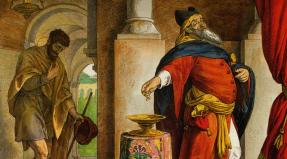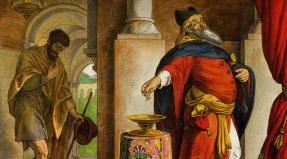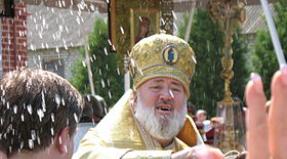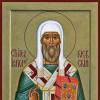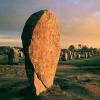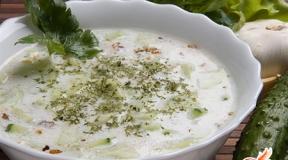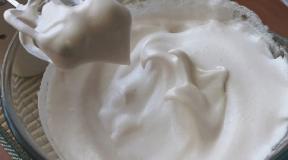Nile of Sinai. The Ascetic Admonitions of the Monk Nile of Sinai. Nil of Sinai, Venerable Exhilarating chapters
Reverend father of our Nil ascetic, letters // Christian reading, published at the St. Petersburg Theological Academy. Part 1, St. Petersburg. 1845
Brief information about him
The Monk Nile came from a wealthy and noble family and, probably, even then, as St. Chrysostom was a preacher in Antioch, he was a listener and his disciple. Noble birth and personal merit raised him to the rank of prefect of the capital. But the aspirations of his spirit did not agree with the proper troubles and orders of life in the capital. Why, having agreed with his wife, with whom he already had two children, he left the world, so that in solitude he would be more successful than his mother-in-law by way of salvation. He, taking with him the son of Theodul, settled in Sinai; and his wife and daughter found shelter in one of the Egyptian convents.
In the Sinai desert, the teacher. The Nile lived extremely strictly: with their own hands and his son they dug a cave for themselves and, living in it, ate not even bread, but wild bitter plants. All the same, their time was spent in prayer, study of Scripture, Divine thinking and works.
Leaving the world, however, the teacher. Neil did not leave communication with people. From all places and all kinds of people turned to him with their spiritual needs, and no one was left without the necessary admonition and edification. And the king wrote to him, asking for prayers, and he wrote to the king, reproaching him for injustice to St. Chrysostom. Other writings of the monk are predominantly of moral and ascetic content. From everything he wrote, it is clear how extensive and deep his knowledge was, and how tireless his labor in this matter.
To test his love for God there was a special temptation for him. Wild barbarians from Arabia attacked Sinai and its surrounding areas, and they plundered everything, beat many, and took some into captivity. Among the latter was Theodulus, the son of St. Nile. This misfortune was very sensitive for the monk, and he could not find rest for himself, especially when, on the second or third day after the general misfortune, the news was brought to him that his son was sacrificed by the savages to the matinee, the star Venus, without claiming whether it had been fulfilled. there was such a definition. But not for long, God allowed his parental heart to languish. He soon learned that the sacrifice did not take place and the captives were sold out to Christian countries. A search later found him in the city of Eluza, whose bishop bought him from the barbarians along with others, and was already preparing him for the ministry of the Church, to which he was begged and his father arrived for him. Their love of living in the wilderness did not allow them to agree to this; and the bishop, having ordained them as priests, blessed them to go to their beloved Sinai, where they remained until the end of their lives.
NS. The Nile left the world in 390; he lived in the Sinai desert for 60 years and died about 450 g. His memory is November 12 and January 13. His relics under Justin the Younger were transferred to Constantinople, and laid in the church of St. Apostles.
From the writings of St. Nile into Greek Philanthropy, and from it into Slavic, taken - the word about prayer and the word ascetic. A word about prayer we also take into our Philosophy; instead of the ascetic word, we prefer to take the word about eight spirits of guile, and two collections of summaries and instructions, of which one is entitled: - chapters or exhortations, - and the second: - thoughts that take a person away from the perishable and stick to the imperishable... - But how about prayer and about the struggle with passions, a lot of the most beneficial advice and instructions was expressed to the monk in his other writings, just as there are everywhere in abundance prescriptive thoughts and in general about the moral order and especially about life detached from everything: then thinking what was it would be unfair to deprive our Philosophy of these treasures, we decided to borrow them from the said scriptures of the monk, placing what refers to prayer, under the word about prayer, - that to the struggle with the passions, - under each of the eight passions, which is for general edification, - under the collection of sayings. We imitate the ancients in this. For the Patrol. graec. Migne t. 79, where all the writings of St. Nile, after thoughts that take away from the perishable and stick to the imperishable, - pp. 1249-50, - a note was made that in the manuscript with which these thoughts were printed there, there are another ten-four thoughts borrowed from the word about non-acquisitiveness, then from the article about superiority being in silence before life in the city. These borrowings themselves have not been published; but the example does not lose anything through this.
Quotations of these borrowings will mean at the end of the articles, indicating the volume and page - according to the publication of the saint's creations in Russian translation. Articles without citations are on the same page as above.
Commemoration: November 12/25
The Monk Nilus of Sinai (+ 450) - disciple of John Chrysostom, author of ascetic works and interpreter of Holy Scripture.
NS re-natal Nile of Sinai
***
A word about prayer
Foreword
You raised me in good time, lying in the burning fever of unclean passions, with the touch of your God-loving letter, and my mind, ailing with the most shameful ailments, encouraged me with consolation, blissfully imitating the great Instructor and Teacher. And not wonderful. It has always been your share to seek the glorious and significant, like the blessed Jacob. Why, having worked well for Rachel and having received Leah, you are looking for your beloved, as well as for her who fulfilled the seven years (Genesis 29: 20-28). And I do not deny to admit that, having worked all night, I did not catch anything; but, according to your word, when he plunged into the sea, he brought out a multitude of fish, I do not think that - great, but one hundred and fifty and three (John 21:11). And I send them to you in the garment of love; and thus I fulfill your command, making up an equal number of chapters (on prayer). I am amazed at you and greatly indulge your wonderful will that you desired (not something else), but chapters on prayer; and, moreover, he not only wished that they should be written on the charter with his hands, but that they be implanted in the mind with love and gentleness. Because "all the double, is one against the one," according to the word of the wise Sirach (42:25), then not only accept them by letter, but also understand in spirit. For the paucity of chapters, do not scold, as he who knows how "both be satisfied and be deprived" (Phil. 4:12). Do not scold her, remembering that the Lord did not reject even two of the widow's mites, but accepted them more favorably than the rich contributions of many others. But even more, being able to preserve goodwill and love in relation to your sincere brethren, pray for the non-material, so that he becomes healthy, and taking his bed he begins to walk, by the grace of Christ. Amen.
One hundred fifty-three chapters on prayer
1. If anyone wanted to prepare a fragrant incense, then according to the law, he must add in equal parts "pure Lebanon, Cassia, Onych and Stackti" (Ex. 30:34). This is the quadruple of virtues. When they are all in complete perfection and in equal strength inherent in the soul, then the mind will not be betrayed (treacherously, of course, by some inner traitor).
2. The soul, purified by the fullness of virtues, puts the mind in a state of steadiness, making it capable of accepting the dispensation that is required (in prayer).
3. Prayer is a conversation of the mind to God. What kind of dispensation does the mind need so that it can, without illumination backward (or here and there), ascend to its Master and converse with Him without any intermediary?
4. If Moses, intending to come nearer to the burning bush of the earth, was forbidden to do this until he removed his boots from his feet (Ex. 3. 5), then how can you not detach from yourself all passionate thoughts when you wish to see the One who is higher every feeling and thought, and be His interlocutor?
5. First of all, pray for receiving tears, so that by crying to soften the cruelty in the soul (Greek - "savagery") and confessing to yourself "the iniquity of the Lord" (Ps. 31: 5), to receive from Him the remission of sins.
6. Use tears as a tool to receive any petition; for Vladyka is very happy about you when you pray with tears.
7. When you pour out streams of tears during your prayer, do not at all ascend in yourself, as if you are higher than many. This help from above has been accepted by your prayer, so that you, zealously confessing your sins, may propitiate the Lord with tears.
8. Do not turn the means against passions into passion, so as not to anger even more the One who has given you this grace (that is, tears). Many, shedding tears for sins, forgot the purpose of tears and, having raged, turned away (from the right path, or went mad).
9. Stand patiently and pray firmly, cutting off the pursuits of everyday cares and all thoughts; for they disturb and disturb you in order to frustrate your prayer striving.
10. When the demons see that someone has zeal and zeal to pray as it should, then (during prayer) they put thoughts on him about something that is necessary (and leave) and after a little they again awaken the memory of that, moving the mind for consideration (if this is a question - and permission, if a thing - for acquisition); - and he, not finding what he was looking for, grieves and grieves. Then, when he starts to pray (this zealous zealot of prayer), they remind him of what he was thinking about and what he was looking for, so that the mind, moving again to knowledge (not resolved before), would make prayer fruitless.
11. Strive to make your mind deaf and dumb during prayer; and then you will be able to pray as you should.
12. When temptation meets you, or irritates someone's rebellion, so that you either move to anger against the one who opposed you, or even utter some inappropriate word; then remember about prayer and about the judgment during it (over you in conscience before the face of God), and immediately the unruly movement will be tamed in you.
13. Whatever you do in revenge on your brother, who has justified you, all this will tempt you (you will be embarrassed) during prayer.
14. Prayer is a branch (from the tree) of meekness and anger.
15. Prayer is the manifestation (protooriya) of joy and thanksgiving.
16. Prayer is a cure for sorrow and despondency.
17. "Go, sell your property, and give to the poor" (Matt. 19:21), and having taken the cross, deny yourself (- 16:24), so that you can pray without entertainment.
18. If you want to pray a praiseworthy prayer, deny yourself during prayer and, enduring extreme bitterness, be wise in prayer for the sake of prayer.
19. If whatever sorrow you have to endure, you will be wise; then you will receive this fruit during prayer.
20. If you want to pray as you should, do not grieve your soul (or keep your grief in your soul); otherwise your flow (or your prayer work) is in vain.
21. “Leave your gift,” says the Lord, “before the altar, and when you have gone, be humbled to your brother” (Matthew 5:24), - and then, having come, you will begin to pray without embarrassment; for malice brings darkness to the sovereign mind of the one praying and surrounds his prayers with darkness.
22. Those who collect sorrow (grief) and resentment within themselves, and who hold prayer (in this state), are like those who draw water and pour it into a leaky pot.
23. If you are patient, you will always pray with joy.
24. When you pray, as it should, you may encounter (or come to mind) any deeds for which it seems righteous to you to be angry with your neighbor. (Beware). - There is no anger at all against a neighbor that would be righteous. And if you look around, you will find that it is possible to arrange things well without anger. Why contrive in every possible way - do not move to anger.
25. See how, thinking to heal another, you yourself do not remain unhealed, and not give punctuation to your prayer.
26. By sparing others and not being angry with them, you will also find mercy for yourself, you will show yourself reasonable in regard to your opinion of yourself and you will be among those who truly pray.
27. Arming yourself against anger, you will never tolerate the engagement of lust; for it gives food to anger, and this one revolts the clever eye and damages the prayer dispensation.
28. When praying, do not limit yourself to external bodily movements and positions, but raise your mind into a feeling of spiritual prayer with great fear.
29. Sometimes you just start to pray, and immediately you start praying well; and sometimes, and having worked hard, you will not achieve this desired goal; (and this is allowed to you in order) that you seek (prayers) even more zealously and, having received, have a prayer that is perfectly correct, safe from protection.
30. When the Angel approaches us, immediately all those who chill for us (demons) are removed: the mind is then in great joy and prays in good health. And sometimes, during an ordinary battle, the mind beats struggling and is not given to it to arise (to God-thinking and well-being). This is for the fact that he had previously referred to different passions (carried away, tasted them). However, if he looks for more, he will find, and if he is not too lazy to push, it will open to him.
31. Do not pray, let it be according to your desires; for they do not agree with the will of God in everything. But it is better to pray as taught, saying: "Thy will be done" on me (Matt. 6:10). And in every matter ask Him this way: for He always desires good and useful things for your soul, and you do not always seek this.
32. Many times, praying, I asked, let it be to me that seemed good to me, and insisted on the petition, unwisely bothering the will of God, and not giving God to arrange better what He knows useful for me. But having received (what was asked), I was then in great sorrow, and precisely because I did not ask, let it be better according to the will of God; for the matter turned out to be not what I thought it was for me.
33. What is good besides God? Let us surrender to Him everything that concerns us, and our good will be; for, of course, the Good One is also the giver of good gifts.
34. Do not grieve, not immediately receiving from God what you ask for. He wants to give you a greater blessing by the way that makes you with patience to stand before Him in prayer. For what is higher, how to extend the conversation to God and be embraced to be in communion with Him.
35. Undistributed prayer is the highest intelligent deed.
36. Prayer is the ascent of the mind to God.
37. If real prayer is desired for you, renounce everything, so that you will inherit everything.
38. Pray firstly about being cleansed of passions, secondly about getting rid of ignorance and oblivion, and thirdly about being delivered to be from all temptation and abandonment.
39. Seek in your prayer only righteousness and kingdom, that is, virtues and knowledge - and so on, everything "will be added to you" (Matt. 6:33).
40. Righteously prays not only for his own cleansing, but also for the cleansing of every person, in imitation of the Angelic order.
41. See if you truly stand before God in your prayer, or if you are conquered by the desire for human praise and you try to catch it, covering this (not a good desire with a specious) length of prayer.
42. Whether you pray with the brethren, or alone, strive not only to satisfy the custom, but to pray in emotion.
43. It is characteristic of prayer (this is in feeling) self-absorption with reverence, affection and mental illness, during confession with the unspoken sighs of sinful falls.
44. If your mind is stained during prayer, then it is not praying like a monk, but there is also a layman who adorns the outer tabernacle.
45. When you pray, keep your memory with all your might, so that it does not offer you its own; but in every possible way raise yourself up to a reasonable stand (with the consciousness of whom and for what you stand). For during prayer, the mind is usually very tinted with memory (it brings up things, persons, events, and with them distracts the mind's attention from prayer).
46. Memory brings you to mind during prayer or imagination of old deeds, or new concerns, or the person who offended you.
47. The demon is very jealous of the person praying and uses all sorts of tricks to frustrate his intention; therefore, it does not cease to stir up thoughts about various things through memory, and through the flesh sets in motion all passions in order to only hinder in some way its beautiful flow (i.e. prayer work) and to God transcendence (ascent by attention).
48. When the all-evil demon, having used many tricks, does not have time to prevent the prayer of the zealous (prayer book); then he does not much weaken (his attacks), but then, when he finishes the prayer, he takes revenge on him. For, either having inflamed him with anger, he destroys that wonderful mood that is acquired by prayer, or by irritating some wordless sweetness (an urge to taste sensual pleasure), he laughs at the mind.
49. Having prayed as it should, expect what should not - and stand courageously, guarding your fruit. From the very beginning you have been set for this - that is, to "do and keep" (Gen. 2:15). Why, having done (having completed the prayer as it should), do not leave without guard what you have acquired through labor; otherwise, there will be no benefit to you from prayer.
50. All the warfare waged between us and the unclean spirits: not because of anything else, but because of spiritual prayer, for it is very opposed to them and unbearable, but it is salutary and favorable to us.
51. Why do demons want to arouse in us by their influence gluttony, fornication, avarice, anger, rancor and other passions? So that the mind, clothed with them, could not pray as it should; for the passions of our unreasonable part, having begun to act (having come into motion), do not allow the mind to act rationally.
52. Virtues are passable because they are required by nature; We submit to nature for the sake of the Word that fulfilled it - (the Lord). But this word is usually made clear to us (it is clearly imprinted in our minds) in a state of prayer.
53. The state of prayer is a dispassionate dispensation, which with extreme love delights the wise and spiritual mind to the highest level.
54. Not only over anger and lust, one who wants to pray truly must have dominion, but also be a stranger to all passionate thoughts.
55. He who loves God always converses with Him as with the Father, turning away from all passionate thoughts.
56. Not everyone who has mastered dispassion already prays truly; for such a person can still be busy with simple thoughts (about things, without passionate movements) and amuse himself with their stories (maybe with their pictures and their various combinations), and be far from God. (There are no passionate movements, but the mind is dreaming).
57. But even when the mind does not touch in simple thoughts, about things, it does not mean that it has already reached the place of prayer: for it may be busy with (philosophical) speculation about these things and go deeper into their causal relationships. Although all these are the essence of abstractions, but as they are the essence of speculation about things, they imprint their images in the mind - and take it far from God. (Passion is not in motion, but the mind philosophizes, not prays: the state of scientists).
58. Let the mind be higher and speculations about material nature, it does not yet follow that it has already seen the real place of God: for it can be busy with the cognition of mental creatures (the Angelic world), and dazzle with them (be full of various thoughts and ideas about them) ...
59. If you want to pray properly, then you need God who gives prayer to the one who is praying. Call him in prayer, saying: "Hallowed be Thy name, let Thy kingdom come" (Matt. 6: 9. 10), i.e. Holy Spirit and Thy Only Begotten Son. For thus taught the Lord Himself, saying that to the Father "in spirit and in truth it is worthy to bow down" (John 4:24).
60. He who prays in spirit and truth does not borrow thoughts from creatures to the greatness of the Creator, but from Himself draws contemplation for praising Him.
61. If you are a theologian, you will pray truly; and if you truly pray, then you are a theologian.
62. When your mind, flaming with desire for God, little by little, as it were, renounces the flesh and turns away from all thoughts emanating from sensory impressions, or from memory, being at the same time full of reverence and joy; then conclude that he has approached the limits of prayer.
63. The Holy Spirit, descending to our weakness, comes to us even when we are not yet clean; and if only our mind finds it sincerely praying to Him, finds it and disperses the entire crowd of thoughts and ideas surrounding it (makes it disappear), thereby disposing it to the desire for spiritual prayer.
64. Others (spirits - good and evil), through their influence on the body, introduce thoughts, ideas and imaginations into the mind; and the Lord acts in the opposite way: infiltrating the mind itself, imparts knowledge to it about whatever He pleases - and by means of the mind tames the intemperance of the body.
65. Worthy of any censure is he who loves true prayer, is angry or resentful: for he is like the one who wants to look sharply, and meanwhile he polishes his eyes.
66. If you want to pray as you should, do not do anything that resists (hostile) prayer, so that God will come closer to you.
67. When you pray, do not give the Deity any appearance, and do not allow your mind to be transformed into any image (or to represent yourself in some way, or so that any image is imprinted in your mind); but approach the immaterial in an insubstantial manner, and you will come to terms with it.
68. Beware of the enemy's nets: for it happens that when you pray purely and serenely, suddenly some strange and alien image appears to you. The enemies do this in order to lead you into conceit, instilling the idea that here the Divine (appeared to you), and then so that you would think that, like this, suddenly appeared to you, the Divine is quantitatively (occupies a place, extended , has parts), while the Deity has neither quantity nor appearance.
69. When the envious demon does not have time to set the memory in motion, then he acts on the blood and juices, so that through them to produce in the mind the imagination of something alien and fill it with images; he, accustomed to spinning in thoughts, is easily carried away by that, and thinking that he is rushing towards immaterial and formless knowledge, is deceived, accepting smoke instead of light.
70. Stay on your guard, guarding your mind from thoughts during prayer and trying to stand in a peaceful dispensation, so that "Compassionate to the ignorant" (Heb. 5: 2) would come to you and give you the glorious gift of prayer.
71. It is impossible for you to pray purely, entangling yourself with material matters and being agitated by incessant cares: for prayer is the deposition of (all outside) thoughts.
72. A person who is bound cannot run - and the mind, working with any passion, - to see the place of spiritual prayer; besides, he reigns and rushes with passionate thoughts, and does not have an unshakable standing.
73. When the mind finally begins to pray purely and impassively, then the demons no longer step on it from shui, but from the gums: they imagine the appearance as if the glory of God, and some kind of figurative representation, feeling pleasant, so that it will seem to him that he has completely reached the purpose of prayer. This, as one husband who knows the business (Evagrius) said, it happens from the passion of vanity, and from the demonic touch to a certain place in the brain and from shock (or inflammation) he lived in it.
74. I think that the demon, touching the said place, as he wants, transforms the light that is near the mind; from this, vanity is moved to a thought that compels the mind to frivolously assimilate the Divine and essential knowledge. Since he is not disturbed by fleshly impure passions, and he is purely in prayer, he does not in any way think that there was any enemy action - and he assures that this is definitely a Divine phenomenon, while it came from a demon who , using extreme cunning, through the brain, as we said, the light coupled with the mind changes and forms it itself (it gives it an image itself, or it makes us imagine).
75. The angel of God, having presented himself, in one word stops the hostile action in us and moves the light of the mind to act unchallengeably.
76. What is said in the Apocalypse about the Angel that he brings incense, "let him give the prayers of the saints" (Apoc. 8: 3), I think, indicates this grace, acting through the Angel, which imparts the ability to truly pray; so that the mind finally stands in prayer without confusion of thoughts, without despondency and cowardice.
77. Vials with incense are, as they say there, "the prayers of the saints", which were brought by "twenty-four elders" (Apoc. 5: 8). By phial should be understood as friendship with God, or perfect, spiritual love for Him, in which prayer is activated by spirit and truth.
78. When you think that during your prayer there is no need for you to cry for your sins, then look how far you are from God, being obliged to always abide in Him, and you will shed the warmest tears.
79. Truly so: realizing your measure (poverty and insignificance), you will cry in sweetness, cursing yourself like Isaiah - as "being unclean and unclean in the mouth" and living among such people, that is, opponents (of God, - of impure forces or thoughts), you dare to stand before the Lord of hosts (Isa. 6: 5).
80. If you pray truly, you will receive a largely complete certificate and the Angels will gather to you, as to Daniel, and enlighten you by knowing the reasons why what happens.
81. Know that the Angels excite us to prayer and stand with us on it, rejoicing and praying for us together. So, if we are negligent and accept disgusting thoughts, then we are extremely angry with them; for while they strive so much for us, we do not want to beg God for ourselves, but neglecting our service to God, and leaving their God and Master, we conduct a conversation with unclean demons (in thoughts).
82. Pray peacefully and serenely, sing rationally and well-tempered, and you will be like a nestling of eagles rising to the heights.
83. Psalm lulls passions and tames the urges of bodily incontinence; and prayer adjusts the mind to the intelligent doing peculiar to it.
84. Prayer is doing decent to the dignity of the mind, or better, its real use.
85. Psalm is an image of many different wisdom; and prayer is the beginning of non-material knowledge.
86. Doing is a wonderful thing; it promotes prayer by awakening the mental power of the mind to the contemplation of divine knowledge.
87. If you have not yet received the gift of prayer or psalmics, then ask persistently and you will receive.
88. “The verb (the Lord)” and a parable to them, as befits always to pray, and do not be cold ”(Luke 18: 1). Therefore, do not grieve or be discouraged that you have not yet received; The Lord added this: "If I am not afraid of God, and I am not ashamed of man: but this widow does her work, I will avenge her" (- 5). So also "God will take vengeance on those who cry to Him day and night soon" (- 7 Be kind, with diligent patience in prayer.
89. Do not wish that what concerns you was as it seems to you (better), but as God pleases; and you will be serene and grateful in your prayer.
90. At least you were already with God, apparently, beware of the demon of fornication; for he is very seductive and insidious, and in every possible way it is intensified to overcome the striving of your sober mind, and to distract him from God, even when he stands before God with reverence and fear.
91. If you rejoice about prayer, then get ready for demonic obsessions and patiently endure their scourging, for like wild beasts they will attack you and ulcerate your whole body.
92. Get ready, like an experienced fighter - do not hesitate, even if you suddenly saw what kind of ghost, - do not be embarrassed, even if the sword was turned at you, or the fireman was directed at your face, - do not lose heart (do not be timid), at least what an ugly and insidious ghost (face) presented itself to you; but stand still, confessing a good confession, and boldly behold your enemies.
93. He who endures the sad, he will be worthy of the joyous; and he who endures the unpleasant will not be deprived of a part in the pleasant.
94. Be careful, let not evil demons deceive you with any vision. (If something like this happens, then) being collected in yourself, turn to prayer and ask God that, if it is from Him (for admonition), He Himself will enlighten you, and if not, then quickly drive the adorable away from you. And dare; for these dogs will not stand up when you come to God with warm prayer, but immediately invisibly and invisibly, being by God's power, they will run far away from you.
95. You ought to know the following cunning of demons. Sometimes they divide themselves into groups. Some come with temptation. And when you seek help, others come in in an angelic form and chase away the first, so that you are seduced by the opinion that they are real angels, and fell into self-esteem that you are worthy of it.
96. Try to be as humble and courageous as possible - and the enemy attack of demons will not touch your soul and their scourge will not come close to your body. "By His angel the commandment about you" (Lord) "keep thee" (Psalm 90:10. 11); and they will invisibly reflect from you any enemy action.
97. Although the noise, and stomping, and cries, and curses will hear from the demons who are trying to keep a pure prayer, but will not fall in thought and will not betray it to them, saying to God: "I will not fear evil, as you are with me" (Ps. 22: 4), and the like.
98. During such temptations, always use short but intense prayer.
99. If the demons begin to threaten you, that they will suddenly appear in the air to amaze you and steal your mind, do not be afraid of them and do not at all worry about such a threat from them. It is they who frighten you, torturing you, whether you put them into something, or have completely despised them already.
100. If you appeared to God Almighty, Creator and Provider in prayer, why do you stand before Him so unwisely that, leaving His irresistible fear, you are afraid of flies and mosquitoes? Or do you not hear what the Prophet says: "Let thy God fear the Lord" (Deut. 10:20), - and again: "They all fear him and tremble at the sight of his power" - and so on (2 Chronicles 36: prayer of Manasseh) ...
101. As bread serves as food for the body, and virtue for the soul, so spiritual prayer is food for the mind.
102. Pray not in a Pharisee, but a tax-collector in a sacred place of prayer, so that you too may be justified by the Lord.
103. Strive not to pray against anyone in your prayer, so as not to destroy what you create, making your prayer disgusting (before God).
104. Let the debtor teach you with "my talents" that if you do not leave (the debt) to your debtor, then you yourself will not receive the remission (of your debt); for it is said: "give him over to the tormentor" (Matthew 18:34).
105. Put aside bodily needs during your prayer (God), so that the bite of a flea, mosquito and fly does not deprive you of the greatest gain that prayer brings.
106. It has come down to us that one Saint, when he stood up for prayer, the wicked one fought so much that as soon as he raised his hands, as this one, being transformed into a lion, raised up his front paws and, having thrust his claws into the sides of the ascetic, did not retreat, until he gave up. But he never put them down until he finished his usual prayers.
107. The same was, as we know, and the silent in the ditch, John the little, or better to say, the greatest monk, who persistently remained in intelligent coexistence with God, when the demon in the form of a dragon twisted around him, gnawed his flesh and vomited it in his face ...
108. Of course you read the lives of the Tavennisiot monks, which says that when Abba Theodore spoke a word to the brethren, two vipers crawled to his feet, and he, not in the least embarrassed, bent his feet as if with a vault and, letting the vipers under them, continued the word to the end ; and then he showed them to the brethren, having told the case.
109. We also read about another spiritual brother, that when he was praying, the echidna, crawling, touched his leg; but he did not lower his hands before, as after completing the usual prayer. And this one, who loved God more than himself, suffered no harm.
110. To those who are not having fun, hold your eye during prayer and, having renounced the flesh and soul, live with your mind.
111. To another certain Holy, strong prayer-book, who was silent in the desert, the demons appeared and for two weeks they played with them like a ball, throwing it up and picking it up on the mat; however, they could not at all bring down his mind from ardent prayer.
112. To another God-loving monk, when he was making a mental prayer, walking in the wilderness, two Angels appeared and went with him, having him in the middle. But he did not pay attention to them for a minute, so as not to suffer damage in the best, for he remembered the saying of the Apostle, who says: "Neither angels, nor beginnings, below strength can separate us from the love of Christ" (Rom. 8:38. 39 ).
113. The monk by prayer becomes equal to the angels, longing to "see the face of the Father, Who is in heaven" (Matthew 18:10).
114. Do not desire or seek to see any face or image during prayer.
115. Do not wish to see sensually Angels, or Power, or Christ, so as not to go crazy, taking a wolf for a shepherd and bowing to enemies - demons.
116. The beginning of the seduction of the mind is vanity, by which the mind is moved, attempts to describe the Divine in any image and vision.
117. I will speak my own what I have said to the novices; blessed is the mind that during prayer keeps perfect silence.
118. Blessed is the mind that, praying without amusement, accepts more and more the desire of God.
119. Blessed is the mind, which during prayer is insubstantial and non-covetous.
120. Blessed is the mind that, during prayer, keeps perfect insensitivity to everything.
121. Blessed is the monk who venerates every person, as it were, as a god after God.
122. Blessed is the monk who regards the achievement of salvation and the prosperity of all as his own.
123. Blessed is the monk who considers himself to be the scum of all.
124. A monk is one who, separating from everyone, is in union with everyone.
125. A monk is one who considers himself to be with everyone and sees himself in everyone.
126. The one who performs the prayer, who always bears fruit to God all his first thought.
127. Avoid all lies and all gods, like a monk who strongly desires to pray; otherwise, in vain you take on a form that is unusual for you.
128. If you wish to pray in the spirit, do not borrow anything from the flesh - and you will not have a cloud that spreads darkness before you during prayer.
129. Entrust your bodily needs to God, and it will be obvious that you are also entrusting your spiritual needs to Him.
130. If you are worthy to receive the promises, you will reign. In view of this, shouldn't you gladly endure real poverty?
131. Do not deny poverty and sorrow (life), - these instruments (wings) of easy prayer.
132. May bodily virtues be the guarantee of the soul, the spiritual - spiritual, and these - immaterial and essential knowledge.
133. If, praying against any thought, you notice that he quickly and easily subsided, then consider what it came from, so as not to fall into an ambush, and, being deceived, not to become a traitor to yourself.
134. It happens that sometimes the demons, having put some thoughts into you, themselves urge you to pray against them, to contradict them, and immediately run away; so that you fall into delusion, thinking that you have already begun to conquer thoughts and frighten the demons.
135. If you pray against any passion or any demon that chills you, remember the words of the Psalmist: "I will marry my enemies, and I will comprehend, and I will not return, until they die: I will offend them, and they will not be able to do things, they will fall under my feet", and so on (Ps. 17:38. 39). But say it in good time, arm yourself against the resistance fighters with humility.
136. Do not think to acquire virtue without first fighting for it to the point of bloodshed. It is necessary, according to the Divine Apostle, to stand up to death against sin by striving in order to be kept blameless (Heb. 12: 4).
137. It happens that, having done good to one, you will suffer harm from the other (through the intrigues of the enemy), so that when you meet in vain, you say or do something inappropriate, and in this way you squandered evil that you collected good. That is the goal of the crafty demons. Therefore, one must rationally pay attention to oneself.
138. Subjecting yourself to demonic aspirations against you, take care in every possible way so as not to fall into slavery to them.
139. At night, wicked demons themselves seek to confuse the spiritual teacher; and in the daytime - through people, surrounding him with unpleasant accidents, slander and troubles.
140. Do not refuse to tolerate these felts. Let them beat and trample underfoot, stretch and stroke; but through this garment yours is made brighter.
141. Until you have completely renounced passions and your mind still reveals resistance to virtue and truth, until then you will not find fragrant incense in your bosom (that is, pure and warm prayer).
142. Do you want to pray (as it should)? Having moved from the local, always have a residence in heaven, not only in words, but by angelic deeds and the most divine understanding.
143. If only in distress (being subjected to strong temptations, being in danger of falling), you remember the Judge, how terrible and unwashed, then you have not yet learned to "work the Lord with fear and rejoice in Him with trembling" (Ps. 2:11) ... Know that with spiritual comfort and consolation it is still more necessary to serve Him with fear and reverence.
144. Wise is the person who, before complete repentance, does not cease with sorrow to remember his sins, and about the righteous punishment for them in eternal fire.
145. Abiding in sins and God-wrath, - and shamelessly daring to reach for the knowledge of Divine things and for immaterial prayer, may he accept the Apostolic prohibition that it is not safe for him to pray with a naked and uncovered head. Such a soul, let us say in the words of the Apostle, "must have the power of the Angel on the head" for those who are present (1 Cor. 11:10), clothed in shame and proper humility.
146. Just as the patient with eyes will not benefit from a long and intense gazing at the sun, in the strongest light at noon, so the passionate and unclean mind will not benefit from the imagination of a terrible and unnatural prayer in spirit and truth; on the contrary, the Divine will raise up to indignation at him.
147. If one who comes to the altar with a gift is not accepted by the One who has nothing in need and the Impartial, until he is reconciled with his neighbor grieving for him (Matthew 5:23), then see what kind of protection you need and what prudence you need to bring incense that is favorable to God on a mental altar.
148. Do not be words-loving, nor popular; otherwise it will be obvious that sinners are doing “not on the ridge,” but on your face (Psalm 128: 3). And you will be a laughing stock for them during prayer, drawn and seduced from them into vain thoughts.
149. Attention seeking prayer will find prayer. Attention is not followed by another that is better, but prayer, about which all care should be taken.
150. As sight is better than all senses, so prayer is more divine than all virtues.
151. Praise to prayer is not one quantity, but also quality. This is shown by "those who have entered the Church to pray" (Luke 18:10), and the following word: "But you do not speak too much when you are praying," and so on. (Matthew 6: 7).
152. As long as you pay attention only to the position of the body that is decent for prayer and your mind cares about only the external beauty of the tabernacle (about other external accessories for prayer ... compare ch. 44), until then (know that) you have not yet seen the place of prayer, but that her blessed path is still far from you.
153. When, while standing in prayer, you are above all other joy, then (know that) you have truly found prayer.
154. Prayer and reading are wonderful; they stop the vain wandering of thoughts, tying the thought, circling over what should not, and usefully keeping it to themselves, not a little entertained in this beautiful occupation (1:16).
155. Prayer sets us up for an interview with God and with a long-term skill in this brings us into fellowship with Him; with Him, Who even accepts insignificant people into love and is not ashamed of friendly intimacy with them, as long as the love that abides in them gives them boldness (1:17).
156. Prayer removes the mind from all thought about the sensuous, lifts it to God Himself, above all that exists, in order to talk to Him and boldly ask Him whatever you want; and thus makes that a person spends a life of purity, as having already been in communion with God, and soon then again preparing for this communion (1:19).
157. Paul teaches "to abide in prayer" (Rom. 12:12), by staying in it for a long time, confirming the skill for it (Col. 4: 2; Eph. 6:18). And he also commands "to make prayers in every place" (1 Tim. 2: 8), so that not a single careless one could apologize for living far from the prayer temple. Every place is suitable for prayer. God accepts those who call Him with a pure heart and righteous deeds, and looking at their disposition, he listens to their prayer, even if the place where they call Him, in our opinion, was no different (1. 20).
158. Sometimes during a vigil one has to read a psalm soon, and sometimes one should prefer the singing of psalms. We must change the way of acting, in contrast to the intrigues of enemies, which sometimes inspire to drive the tongue at a speed of reading, because of the embrace of the soul with despondency, and sometimes excite to a stately sweet sop (1: 234).
159. When an enemy thought attacks your heart, do not seek one or the other by prayer, but sharpen the sword of tears against the enemy. By opposing the enemy in such a strong, armament, we would sooner force him to retreat from us.
160. Love to practice handicrafts: but even more in prayer memory; because that is not always, but this one incessantly brings forth the fruit of its work. Do not suppress prayer until you have fully repaid the prayer duty, and do not listen to the thought that it is time to sit down to work; equally, when you are sitting at work, do not be overwhelmed by the work, so as not to hurry up the heart and make it unfit for prayer.
161. The mind, from which the thought of God has been stolen and which has become far from remembering Him, indifferently sins also with external feelings: for neither hearing nor tongue can already be such a pest, because from within it has departed a commitment to ascetic labor above oneself (1: 244).
162. It happens that we are trying to do pure prayer and cannot; but it also happens that we do not force ourselves, but the soul dwells in pure prayer. The first comes from our weakness, and the last - from grace from above, calling us through this to seek spiritual purity, which teaches us the same to others, not to ascribe to ourselves if we pray purely, but to acknowledge in this the gift of the Giver of this. "For the sake of God, let us pray, as it is proper, we do not believe" (Rom. 8:26). When we strive to make prayer pure, we cannot, but we are darkened; Then, having soaked the cheeks with tears, let us pray to God that the night of battle will be scattered and light shine in the soul (1: 264).
163. The memory of carnal lusts is outrageous; because not only does it prevent one from talking with God, but even the mind, apparently praying, defiles vile ideas with dreams. It is good to abide incessantly in prayer and exercise the mind in conversation with God. But does this happen with us? - Often distracted from the words of the prayer, we follow the thoughts that lead us away, without renouncing them and not being upset with them, which would be a sign of disagreement of the will with those who inspire the wrong. Although the appearance shows a prayerful look - for, on kneeling down, looking at us we seem to be praying - but with our thoughts we imagine something pleasant, we talk favorably with friends, we curse enemies with anger, we feast with guests, we build houses for relatives, we plant trees, we travel, we study trade, we are forcibly attracted to the priesthood, with great circumspection we arrange the affairs of the churches entrusted to us and we sort out most of all this in our thoughts, for everything that the thought prompts, agreeing to dispose our heart for this in whatever way we like (- 2: 129 -130).
164. Prayer requires that the mind be clean of all thought and do not allow anything that is not prayerful in itself, even if it is worthy; but as inspired by God, having renounced everything, he performed his interview with Him alone (2: 131).
165. He who divides his time between handicrafts and prayer, that body tames the work and brings its disorderly demands to a measure, and the soul, which, working together with the body, desires at last rest, thus disposes to prayer, as to an easier task, and leads to her diligently and with lively forces. For she feels consolation, when things change and go from one to another, while she is bored doing the same thing for a long time; she is burdened by the monotony, but rejoices in the variety of occupations; it seems to her that leaving one thing, she seems to relieve herself of all burdens, why she starts another with fresh strength, as if she is just beginning to work - (2: 231, 232).
166. He who does not like to work, by inaction nourishes passions and desires, gives freedom, to strive for objects akin to them, which is most often revealed during prayer; for then the mind's attention is all absorbed by what the heart is occupied with, and he only does that in his thoughts he goes over what is inspired by the passion that has come into motion, instead of talking with God and asking Him for what is useful to him. Knowing this, St. Paul zealously attacks idleness and obliges everyone by the Apostolic authority to work (2 Thessalonians 3: 6-12). Action is an anchor for thought and gives it a safe direction. Let storms approach from everywhere, and gusts of winds threaten to crash, thought stands unswervingly, held by deed, like an anchor; she is somewhat agitated by the ascending thoughts, but is not carried away into danger, because the bonds that hold her are stronger than the winds that drive her (2: 232, 234).
167. Those who refuse handicrafts under the pretext that they should pray incessantly do not actually pray. By the same token, by what they think in idleness to give the soul freedom from worries, they entangle it in a labyrinth of inanimate thoughts and thus make it incapable of prayer. The body, working on the deed, keeps to itself the thought, which, no less than the eyes, must observe what is being done and assist the body for infallibility in action, and the resting body gives thoughts the freedom to whirl; because during rest, passions are aroused, and with every lustful recollection, the thought is carried away and possessed like a captive (2: 234, 5).
168. There is the highest prayer of the perfect, - a kind of admiration of the mind, its complete detachment from the sensible, when with the unspeakable sighs of the spirit he approaches God, Who sees the disposition of the heart, open, like a book written in writing, and in mute images expresses his will. So Paul was caught up to the third heaven and did not know, "if he was in the body", "if he was outside the body" (2 Cor. 12: 2) (2: 235).
169. After (below) the first there is a second prayer, when the words are pronounced, and the mind follows them with tenderness, and knows to whom the petition is addressed.
170. Prayer, interrupted by thoughts (lower) and combined with bodily concerns, is far from the dispensation appropriate for the one praying. Such a person does not hear himself, rushing to and fro with his thoughts and not remembering which words he utters. But if the praying person is like that, then will the Divine hearing listen to what he himself does not heed out of absent-mindedness? Those who said: "Take my prayer, inspire my prayer" (Ps. 16: 1), and "Thy ears be listening to the voice of my prayer" (Ps. 129: 2), the whole mind was carefully collected there, and did not overflow, on which the thought of the negligent, which does not control itself, is usually poured and scattered (2: 236).
The editors of the Pravoslavie.Ru website present to the readers' attention, for the first time, translated into Russian, the work of the professor of the theological faculty of the University of Belgrade Vikentiy Fradinski - a study on the life and teachings of the Monk Nile of Sinai. The author, who emigrated from Russia after the October Revolution, wrote this work in the 1930s in Serbia.
Foreword
Life and works of St. Nile, the ascetic of Sinai, belong to the second half of the 4th and the beginning of the 5th century, that is, that era of Christianity, which, according to the number and glory of the teachers of the Church, is justly called the "golden age of Christian enlightenment."
Studying this era, scientists, which is very natural, turned first of all to the greatest saints of that time: Basil the Great, Gregory the Theologian, Gregory of Nyssa, John Chrysostom, Jerome of Stridon, Ambrose of Mediolana (Milan) and Augustine of Ippon.
Alongside these great beacons of Christian enlightenment, St. The Neal, at first glance, occupies a modest place. Shielded by the shadow of famous contemporaries, his personality remains a little aloof, and therefore learned theologians paid much less attention to him.
Until 1915, there was not a single monograph devoted to the life and teachings of this great teacher of the Church, especially famous as the spiritual leader of the monks. And only in modern times there have appeared two works in German: 1) the Catholic work of Dr. Fr. Degenhart “Der hl. Nilus Sinaita. Sein Leben und seine Lehre vom Moenchtum ". (Beitraege zur Geschichte des alten Moenchtum und des Benediktinerordens. 6. Heft), Muenster in Westf., 1915; 2) the Protestant work of K. Heussi "Untersuchungen zu Nilus dem Asketen". (Texte und Untersuchungen. 42. Band. Heft 2), Leipzig, 1917.
To this day, not a single work has appeared in Orthodox theological literature with a systematic presentation of the moral and ascetic teaching of St. Nile of Sinai.
In the patrological and ascetic collections we find brief information about his life, as well as individual fragments from his treatises and letters, however, they are presented without a strictly defined plan and do not give a clear and complete picture of the moral and ascetic teaching of this holy father.
If our modest work could at least partially fill this gap in Orthodox theological literature, then we will consider the goal set by us achieved.
In this work, we, to a large extent, were inspired by the following advice from St. Nile: "Let theologians investigate the lives of the saints and the virtues of those people who have withdrawn from the world and tried to hide, and let them study the beauty that they stand out for - in order to imitate their way of life."
Chapter 1
Life of the prep. Nile of Sinai
Data on the life of St. Nile of Sinai are very scarce. His traditional biography is based on the brief notes of the monk George, known as Amartol (mid-9th century), George Kedrin (12th century) and on a slightly more extensive exposition in the Constantinople Synaxar (under November 12 and January 14) and in the "Church history" of Nicephorus Callista (XIV century).
However, the main source of the life of St. Nile is his own story about the murder of Sinai monks - "Legends about the beating of monks on Mount Sinai and the capture of Theodulus, the son of Nilov", known in literature as "Narrationes".
Place of birth of St. Nile can be identified from his (?) Letter to Iliodor and "Praise to Albian". It is in the letter to Iliodorus, which speaks of the monks living in Sinai, that it is also indicated that among them there is a certain Galatian by origin, who, together with his son, has been carrying the feat of fasting for many years. The following is a description of the sudden attack of the barbarians on the Sinai monks and the capture of the son of the aforementioned elder. However, the young man, through the intercession of the martyr Plato, is miraculously saved and returns to his elder father.
This letter, which tells of the miraculous rescue of a young man from barbarian captivity and his return to his grieving father, undoubtedly refers to the same event that is described in detail in the Narrationes, and on this basis we can assume that it speaks about the reverend Nile. The whole narrative generally agrees with the Narrationes, and therefore Tillemont, Ceiller, Kunze, Bardenhewer, Degenhart and others consider the birthplace of St. Neela Galatia. The praiseworthy word to Albian makes it possible to determine the city in which he was born, that is, Ancyra, because St. Neil tells of Albian that he is from Galatia and a pet of the city of Ankyra. Further, it is narrated that he came to get acquainted with the fasting of the monks who passed we have feat of fasting: "with us" - that is, "outside the city, on the mountain." Thus, about the city of Ankira, the birthplace of Albian, St. The Nile speaks as of his hometown, which gives the right to consider Ancyra Galatian as the birthplace of St. Nile.
K. Heussi mentions one manuscript of the 10th century, in which the works of St. Nile have the title "The Book of St. Nile of the Ascetic from Ankyra Galatian: Letters". This title, as well as the extensive treatise of St. Nile "To the most venerable Magna, deaconess of Ankyra, the word of non-covetousness" confirm the assumption that St. The Nile was born in Galatian Ankyra and that Ankyra was the place with which, as with the place of his birth, St. Neil was in constant contact.
Although Nicephorus Callistus in his "Church History" clearly says that St. Nil of Sinai was born in Constantinople, yet his opinion cannot be confirmed by any evidence and, as we have seen, is in contradiction with certain passages from the works of St. Nile. Therefore, leaving aside the statement of Nicephorus Callistus as evidence flowing from a writer of a later time (XIV century) and therefore "unauthorized", we agree with the opinion of the majority of scholars who consider the birthplace of St. Nile Ankyra Galatian.
Unfortunately, we do not have accurate data on the basis of which we could determine the time of birth, labors and death of St. Nile. Any chronological calculations related to his life are only approximate. In his writings, we find memories of persons and events that show us the way to chronological research, namely: in the works of St. Nile tells about the attack of the barbarians on the Sinai monks, dating back to the beginning of the 5th century; the emperor Arkady (395–408) is mentioned, to whom two letters are addressed; one of these letters, which tells about the expulsion of St. John Chrysostom, speaks of the earthquake that took place in Constantinople, and the other contains a reproach to the aforementioned emperor for the unjustified expulsion of the hierarch of Byzantium John. In addition, a letter to Diocletian (Diocletian) also points to the end of the 4th century, since it mentions that Diocletian saw with his own eyes the already aged heretic Apollinarius, and, as you know, Apollinarius died around 390.
All this information is indisputable proof that the activities of St. The Nile dates back to the end of the 4th - beginning of the 5th centuries.
The starting point in determining the date of his birth is the barbarian attack on Sinai, which, we will assume, took place in 410.
On the years of old age, St. Nile we find evidence in the "Narrationes", namely: in the VI chapter, St. Neil speaks of his senile exhaustion, and elsewhere his son Theodulus calls him "an old father."
This suggests that during the attack of the barbarians, St. Neil was about 60 years old. This means that the date of his birth can be attributed to somewhere in the year 350.
Regarding the origin of St. Nile, we have direct evidence of Nicephorus Callistus, who writes that, due to his high origin, St. Neil was the prefect of Constantinople. That the reverend. Neil really came from a wealthy family, apparently from "Narrationes", where he himself says that the love of solitude won everything in him and forced him to leave home, fatherland, relatives, friends, household and estate.
We do not have any information about whether the parents of Rev. Nile Christians or pagans, and also where St. Nile was baptized and how his youth proceeded.
From the already mentioned testimonies of the monk George Amartolus, George Kedrin and Nikifor Callistus, it is obvious that St. Nilus of Sinai was one of the closest disciples of St. John Chrysostom. However, a direct indication of this in the writings of St. We won't meet Neal. And nevertheless, from his bold letters sent to the emperor Arkady, in which he defends the persecuted saint, it is clearly seen that St. The Nile was one of the devoted and ardent admirers of St. John Chrysostom. Honoring Saint Chrysostom in them, he calls him "the pillar of the Church," "the light of truth," "the trumpet of Christ."
In the writings of St. Nile, the literary influence of St. John Chrysostom. In addition to the two letters testifying to this, there are a number of others, which, as Haidacher proved, bear the imprints of the influence of St. John Chrysostom. In addition to literary influence, indisputably confirming the knowledge of St. Nile of the works of St. John Chrysostom, there is evidence that suggests that St. Nile was personally acquainted with St. John Chrysostom and used his advice and teachings.
The basis for this assumption, according to Kunze and Degenhart, is given to us by St. Neal in his work "On various evil thoughts", where he claims that he had the intention to tell more extensively that demons do not know human thoughts, but guess about them by our body movements; however, the "holy priest" turned him away from the fulfillment of this plan. But this "holy priest" is none other than St. John Chrysostom, because in many places where it is directly spoken of Saint Chrysostom, similar epithets are adopted for him. So, for example, in a letter to the Eparch of the North, St. The Nile calls St. John Chrysostom as a "heavenly man", "a divinely inspired man," a "holy man," and in a letter to Bishop Anastassy - a "wondrous priest", etc. Therefore, we can rightfully, together with Kunze and Degenhart, conclude that under "Holy priest" hides St. John Chrysostom, and thus confirms the direct personal acquaintance of St. Nile with Saint Chrysostom. In addition, the audacious letters of St. Nile in defense of the persecuted St. Chrysostom and frank, without any fear, denunciation of his enemies, including even the emperor himself, become more understandable for us if they trace their origin from one of the close and devoted students to their teacher.
So, the testimony of the monk George Amartola, George Kedrin and Nicephorus Callistus that St. Nil was a disciple of St. John Chrysostom, have a high degree of probability. If the reverend. Neil was one of the closest disciples of Saint Chrysostom, then the question arises, at what period of his life and where their meetings took place. Since St. John Chrysostom first appears in Constantinople in 398, that is, at the time when St. The Nile was already in Sinai, then their personal acquaintance could have taken place in an earlier period in the life of St. Nile, when Saint Chrysostom was in Antioch. It was here that St. Nile from Ankyra to listen to the sermons of St. John Chrysostom and strengthened under his direct spiritual guidance.
Something more can be assumed, that is, that St. The Nile received an excellent education in Antioch, which at that time was one of the main cultural centers. And although he himself in many places speaks of pagan wisdom with vivid contempt, equating it with "rubbish", classical education. "A negative attitude towards Hellenic wisdom," says J. Stieglmeier, "did not prevent him from introducing various material from pagan literature into his spiritual teachings." At the same time, "he shows the knowledge of ancient pagan writers even higher than usual."
As for the social position occupied by St. Nilus before accepting monasticism, then we find information about this in the Constantinople Synaxar, in other Greek synaxaries and monastic passages, as well as in the "Church History" of Nicephorus Callistus. All these sources say that St. Nil, coming from a well-known family, held a high social position, as he was "the diocese of the city of Constantinople". That the reverend. Neal, indeed, was well aware of the "brilliance of worldly glory", as can be seen from a short letter to the bishop Bacchus, in which he, probably based on personal experience, warns Bacchus about possible disappointment, since "the closer he is to the royal chambers, the storms await him. "
As for the family life of St. Nile before taking monasticism, then about her we have the testimony of St. Neela in his Narrationes, where he recounts his life story. From it we learn that St. Neil was married and had two sons. However, his love for solitude, gradually growing and strengthening in him from his youth, made him leave not only a brilliant social position, but also a happy family life. This touching scene of the termination of marriage life is described in sufficient detail by St. Nile.
When he had already decided to leave the world, he took his two sons, brought them to his mother and here, giving her the younger, and the older, that is Theodula, leaving himself, informed his wife of his intention.
Moreover, he announced this in such a tone that his wife immediately felt that his decision was irrevocable; and, on the one hand, obeying the inevitable, and on the other, having before her eyes eternal blessings awaiting the Nile for this sacrifice, she gave her consent to this, although parting with her husband and son caused her great sorrow and tears.
The reason that prompted St. Nile leave the world, his wife and children, we learn from him. He says: “For any intelligent creation, I consider it more appropriate not to indulge in too much pleasure and not to abuse legal permission, but to limit myself to this as soon as possible? Otherwise, when at last the strength will weaken, the desires will fade away and the senile pacification will come by itself, the success in chastity will be attributed not to efforts, but only to the necessity that comes in old age? A wrestler cannot boast of victory and the fact that he did not fall if he did not have someone to fight with. But - honor to the ascetic, if in the blossom of youth, in the flame of lusts, in the fire of passions, his mind wins the victory over desires and suppresses in itself a strong desire for marriage, although it is legal, thereby confirming that he has perfect power over himself ".
Consequently, the reason that prompted St. Nile leave the world and people, purely ascetic, that is, we are talking about a strong desire to acquire eternal blessings through self-denial during the heyday of bodily powers.
In what year St. Neil left mhrrrr and took monasticism, we cannot determine exactly, but there are data that allow us to calculate this approximately.
On the one hand, the fact that he was already married and had two sons, and on the other, his own confession that he left the world "in the color of youth, in the flame of lusts, in the fire of passions" gave rise to Fessler, Schwitz, Degenhart and others make the assumption that St. Neil left the world at the age of about 40, that is, about 390, since we took 350 as the year of birth.
We can derive the image of his residence in Sinai from the Narrationes, where he describes in detail and lovingly the exploits and virtuous life of the Sinai monks. From his narration, it becomes clear to us that the Sinai monks lived either in separate cells, or in dugouts and caves. Their cells were separated from one another by about 20 stadia. This remoteness of cells was not the result of hatred of people, but only a desire to talk with God in complete silence, since the noise of the environment distracts thoughts from the necessary intense attention.
On Sundays, the monks gathered in the church, where they offered up prayers in a conciliar manner, received the Holy Mysteries and spent time in mutual conversations and reading, and were also strengthened by the moral teachings of more experienced monks.
The oldest ascetics set forth teachings on how to avoid popularity and pride, which in desert life are "pitfalls lying near the pier."
In the relationship of the monks, perfect love reigned. Each of them tried to deliver everything needed to the other. They did not know how to buy or sell, because they didn’t use "Caesarean gold", but exchanged vegetables and fruits, mutually giving one to the other with every generosity from whoever had what.
The food of the Sinai monks was very scarce: it usually consisted of vegetables and fruits, but bread was an exception, since only a small number of monks with great difficulty cultivated the barren land.
Some of the monks ate every other day, others twice a week, and still others only on Sundays.
In general, the monks, so as not to “waste a lot of time in serving the flesh,” cared little about food, but for the most part “served God with a pure mind, without burdening thoughts with saturating the body and not pleasing the voluptuousness of the womb.”
Such was the residence of St. Nile, who, leaving his "homeland, friends and property" and becoming a hermit, led a life of painful toil and deeds.
“For a long time,” he says, “this desert gave me the opportunity to spend my life pleasantly, enjoying great silence and, with a favorable wind, heading towards my goal.”
However, this peaceful life was destined to be interrupted: St. Neal was tempted very hard.
One Sunday morning all the monks, and with them St. Neil and his son Theodulus, according to custom, gathered in the church for divine services. But as soon as they performed the divine service, suddenly, like a whirlwind, the barbarians attacked them. They burst in, "like mad dogs," and first rushed to plunder the dry fruits prepared by the monks for the winter, and then they took the monks out of the church and began to chop them with sabers. First they pierced the “priest of the holy place” with sabers, then “the elder who was with him,” and finally the youth who served them.
After that, one part of the monks was captured by the barbarians, and the others were forced to flee, "giving a sign with their hands." Among the latter was St. Neil, while his son Theodulus was among the captives.
Touchingly describes St. Neal his separation from his son. Tied to his son by tender love, he did not even think about his own salvation and did not have the strength to leave, but "silently" remained in place. Prompted by the son, who gave him signs with his eyes, he after all moved from his place and went after the remaining monks, who were heading up the mountain. “My feet,” says St. Neil, - moved forward after them, I do not know how the body followed them, but my heart did not want to go and forced me to often turn to my son. So, following those in front, I came to the mountain and from a height I watched how my unfortunate son was being taken away and how he stealthily? throws his gaze on me. " After the barbarians withdrew, St. Nil, together with the remaining monks, descends from the mountain at night and buries the bodies of the holy martyrs, and then, in search of his son, leaves for Paran. Here he receives the first news of the fate of his son: one young man who escaped from barbarian captivity came to Paran and told St. Nil that the barbarians decided to sacrifice him and Theodula the next morning as a sacrifice to the dawn. With this intention, they already made an altar and laid firewood, without saying anything to the condemned. The fled, having learned from one of the captives, who understood the barbarian language, about their intention, immediately informed Theodul about this, urging him to flee together. However, Theodulus rejected the young man's proposal, saying, "that it is impossible to escape from the will of God, whatever they may be, even if you retired to the most impregnable fortress." Thus, Theodulus, doomed to death, remained, while the young man who told about all this, taking advantage of the darkness of the night, fled. The news of the terrible danger that threatened Theodulus was aggravated by the grief of St. Neela, and he, having lost his composure, was about to fall into complete despair. However, he was encouraged by the behavior of one woman, who was no less depressed than St. Nile, for she received the news of the death of her son, who was killed by the same barbarians. And yet this grief did not deprive her of her courage. On the contrary, having learned that her son was killed and that he bravely fought against bloodthirsty villains, she put on white clothes and with a cheerful expression on her face offered God prayers of thanksgiving for the fact that He deigned to take into His hands the pure soul of her son This woman showed great strength of spirit, affirmed on a living faith in God and on boundless devotion to God's Providence.
The mood of a pious woman was also transmitted to St. Neal, so that "he felt ashamed for a little cowardice, which he succumbed to, grieving for his son."
And from that moment he already courageously endures this temptation, completely surrendering to the will of God; he seems to forget about his unhappiness and, together with other monks, leaves to bury the brethren, who were killed by the same barbarians in the vicinity of Faran. Meanwhile, the inhabitants of Paran, after this attack, sent two envoys to the barbarian king with a complaint. When is Rev. The Nile, having paid the last debt to the dead brothers, came to Paran, the envoys had already returned from the barbarian king, carrying with them written promises of peace and an invitation so that all the victims and those whose relatives were taken into slavery would come to the king. At the same time, the king promised that he would punish the guilty and return the stolen property. Having heard such auspicious news from the messengers, the Farans sent a new embassy, supplying it with rich gifts for the king. Among those sent was St. Nile.
To the place where King Ammon lived, it took 12 days to walk through the waterless desert. When all the supplies of water taken with them were depleted, the members of the embassy, exhausted by intense thirst, on the eighth day of their journey dispersed in different directions in search of a source of water. Rev. The Nile, having separated from the others, climbed one mound and noticed a stream not far off, around which a large detachment of barbarians camped.
Those, as soon as they noticed Rev. Neal, they pounced on him, grabbed him, “tied him up and carried him away. Neal calmly surrendered himself to the barbarians. " “I,” he says, “who were knitted, torn, dragged, did not pay attention to it and, being tormented, did not know what they were doing to me; was my whole mind occupied with the thought of looking for my son? Either I will find him with them and then I will willingly remain with him in slavery, in order to enjoy his contemplation, or I will be killed, and this will serve as the end of my misfortunes. " Meanwhile, while the attention of the barbarians was absorbed by St. Neil, an armed embassy appeared on the hill; his unexpected appearance so struck the barbarians that they, seized with fear, fled, leaving St. Nile and a large amount of loot. After resting at the source and quenching their thirst, the messengers continued their journey the next day and four days later arrived safely at the barbarian king.
Here St. Neal was “swornly” assured that his son had not died and that he had been sold to someone in Elusa.
Rev. Neil immediately leaves for Elusa with two guides. On the way, he meets a young man who tells him the good news that his son Theodul is really alive and that everything is very good with him, because one priest bought him. Arriving in Eluzu, St. Nil goes first to the temple of God to offer a prayer of thanksgiving to God, and then goes to the bishop, where his touching meeting with his beloved son takes place. After silent hugs and tears of joy, Theodulus told the story of his salvation. From it we learn that the barbarians did not sacrifice in the morning dawn only because they slept at the appointed time; then they sold it to a peasant in Subait, and that one to the Elus bishop. After hearing the story of his son, St. Neal confessed to him that during his grief he had made a vow to God: if his son survived, he would lead an even more temperate and strict life. In response, Theodulus exclaimed that he too would be very willing to participate in the fulfillment of this vow and to ascetic along with it, for he considers himself abundantly filled with the grace of God. The Elusian bishop did not interfere with them in the fulfillment of their intentions and generously dismissed them, having previously ordained them to the priesthood as a reward for their labors and deeds.
Having accepted the blessing from the bishop, the father and son return to Sinai, where they spend time in labors and exploits until the end of their lives. About the year of the death of St. Nile, we do not have accurate data, but we can assume that St. Nile died around 430, that is, in the era preceding the Third Ecumenical Council, because in his writings he unequivocally condemns the Nestorian delusions that had already appeared by that time. Memory of St. The Nile is glorified in the Orthodox Church on November 12, and in the Roman Catholic Church on January 12.
In the Constantinople Synaxar, in the Monthly Words, as well as in Nicephorus Callistus, we find evidence that during the reign of Emperor Justin II (565-578) the relics of St. Nile and other Sinai ascetics were transferred to Constantinople and laid under the altar of the church of the holy apostles Peter and Paul.
The Glasnik of the Orthodox Church, Belgrade, 1906 (pp. 197–214 and 315–325) published a study by V. Boshniakovich “The Nile of Sinai”, which, unfortunately, never came out in full. Only the introduction was printed.
See "Chronicle of George Amertol", book. IV, ch. 202 (Migne Patrol. Gr. S., T. 110, col. 733 (17). This short note says that St. Nilus of Sinai, along with Proclus, Palladius, Vrison, Theodoretus, Mark and Isidore Pelusiot, was a disciple St. John Chrysostom.
George Kedrin, in his Historiarum Compendium, literally repeats the expression of George Amartol, whose works he apparently used (Migne Patrol. Gr. S., T. 121, col. 632 B).
The text of the synaxarum was compiled in the second half of the 9th or the beginning of the 10th century. It was published by H. Delehaye. Propylaeum ad acta Sanctorum. Novembris. Synaxarium ecclesiae Constantinopolitanae. Bruxellis, 1902, p. 217.
In the "Ecclesiastical History" of Nicephorus Callistus we find references to St. Nile in three places: two times there are testimonies that the famous ascetic Nil was a contemporary of St. Euthymius (476-573) and St. Simeon the Stylite (beginning of the 5th century) and together with St. Isidore, Mark and Theodoret was a disciple of St. John Chrysostom (see: Migne Patrol.gr.s., T. 146, Histor. eccles., Lib. XIV, cap. 30, col. 1156 D and 1157 A and cap. 53 , col. 1249 D – 1252 A), as well as more extensive information about him in Ch. 54, book. XIV (ibid., Col. 1256 AB).
In the account of events in this letter, there are still certain features that distinguish it from the narration in the "Narrationes". So, for example, here the son is saved from slavery, using the miraculous help of the holy martyr Plato, and returns to his father on horseback. In Narrationes, the father himself, after a long and tiring journey, finds his son in Elusa, in the bishop's house ... For us, this letter is very important, since, along with the Praise for Albian, it makes it possible to draw a conclusion about the place of birth Rev. Neela: the author of this letter, whoever he is, certainly narrates about the life of St. Nile.
Blessed. Jerome in a letter to Marcellinus and Anapsychius (Epist. 126, vol. 2. Migne lat. S., T. 22, col. 1086), which he wrote from Bethlehem in 411 (see note b, col. 1085) , among other things, writes the following: "This year, when I wrote three books, a sudden attack by the barbarians, like an avalanche, swept across Egypt, Palestine, Phenicia, Syria, and we barely got rid of their hands by the grace of Christ." And blessed. Augustine in a letter to Presbyter Victorian (Epist. 111, Migne lat. S., T. 33, col. 422), written at the end of 409 (see note. A. Col. 421), we read: “Recently some of the brethren were killed by barbarians even in those Egyptian deserts, which were removed from any worldly rebellion, so that the monks chose them as the place of their monasteries. " On the basis of the above data from the letters of Blaise. Jerome and blessed. Augustine, we and other scholars believe that the barbarian attack on Sinai took place around 410.Epist., Lib. II, 265. Migne Patrol. gr. s., t. 79, col. 336 A and Epist., Lib. III, 279. Migne Patrol. gr. s., t. 79, col. 521 CD. In the first letter to St. The Nile responds to the request of the Emperor Arkady to pray for the deliverance of Constantinople from the frequent earthquakes. Rev. Nile is surprised that the emperor turned to him with such a request at a time when vice enjoys great freedom in Constantinople, and the great Saint John was exiled. His letter to Rev. Neil ends with the words: "My thought has been killed by the excessive lawlessness taking place in Byzantium." In the second letter of St. The Nile reproaches the same emperor for unjust persecution of representatives of the Church and threatens him with misfortune for listening to the bishops sowing slander and gossip.
One letter to the dean Xenodorus (Ep., Lib. II, 293. Migne Patrol. Gr. S., T. 79, col. 345 BC), in which he quotes the words of the Constantinople Bishop John: an interpretation of the Gospel Matt. 3.16. The second letter to Presbyter Jerius (Ep., Lib. III, 13. Migne Patrol. Gr. S., T. 79, col. 373 BC), in which he quotes the words of St. John Chrysostom about the courageous and uncomplaining raised temptation and gives the example of the long-suffering Job.
In Constantinople Synaxar and in the Greek Menaion it is said that St. Nil had a son and a daughter, and that he and his son went to Sinai, and his wife and daughter withdrew to one of the Egyptian monasteries. On this basis, some patrologists, for example, Filaret, Archbishop. Chernigov (see his work "The Historical Doctrine of the Fathers of the Church", vol. III, paragraph 208, St. Petersburg, 1859, p. 75), make the assumption that the reverend. Neela, besides her son, had a daughter. However, in the writings of St. Neil, we find no confirmation of this. On the contrary, in "Narrationes" we read: "I, friends, had two sons: the one whom I mourn now, and the other, who remained with my mother" (Migne gr. S., T. 79, col. 600 C). Hence it follows that St. Neil had two sons.
See: Enzyklopaedie der kathol. Theologie, Band IX, 1895. Freiburg im Br., P. 398 and William Smith. A Dictionary of Christian Biography. London, 1887, Vol. IV, p. 43.
Degenhart and Schwitz believe that Rev. Nile left the world in 380, since 340 J. Marx is taken as his year of birth without any argumentation in his work "Abriss der Patrologie" (1919, p. 108) asserts that St. The Nile became a monk in 404.
Filaret, Archbishop. Chernigov, believes that St. Neil died about 450 (see his work "The Historical Doctrine of the Fathers of the Church", III, paragraph 208. St. Petersburg, 1859, p. 75), but for this assumption we do not find a solid argument (see Realenzyklop. F. prot. Theol. Leipzig, 1904, Bd. 14, p. 90).
It is known that St. Cyril of Alexandria, fighting Nestorius, whose sermons were widespread among the monks, sent the latter letters against Nestorius (Migne, Cyril. Alex., T. X, Epist. XXVI, 140 CD – 141 AB). Therefore, it is quite possible that St. The Nile, who maintained close ties with the world, was well aware of the Nestorian heresy. And although in his letters we do not find anywhere a mention of the name Nestorius, nevertheless the emphasis on the idea of the union of two natures in Christ (Epist., Lib. II, 292. Migne gr. S., T. 79, col. 345 B) and about the unity of His hypostases, not devoid of polemical coloring (Epist., lib. III, 91. Ibid., col. 428 CD and Epist. 92, col. 428 D), as well as the use of the term "Theotokos" (Epist., lib. II, 180. Ibid., Col. 293 A; Epist., Lib. I, 247. Ibid., Col. 180 D; De mon. Exerc. 776 A), suggests that St. The Nile fought against the Nestorian heresy, which had already come out in a certain form. The term "Theotokos" gave rise to H. Keene to assert that St. Nile died after the Third Ecumenical Council, that is, around 435 (see H. Kihn. Patrologie. Paderborn, Band II, 1908, p. 235).
Philosophy. Volume II Corinthian Prelate Macarius
Reverend Nilus of Sinai
Reverend Nilus of Sinai
Summary of the Reverend Nile
The Monk Nile came from a wealthy and noble family and, probably, even then, as St. Chrysostom was a preacher in Antioch, he was a listener and his disciple. Noble birth and personal merit raised him to the rank of prefect of the capital. But the aspirations of his spirit did not agree with the proper troubles and orders of life in the capital. Why, having agreed with his wife, with whom he already had two children, he left the world, so that in solitude he would be more successful than his mother-in-law by way of salvation. He, taking with him the son of Theodul, settled in Sinai; and his wife and daughter found shelter in one of the Egyptian convents.
In the Sinai desert, St. The Nile lived extremely strictly: with their own hands and his son they dug a cave for themselves and, living in it, ate not even bread, but wild bitter plants. All the same, their time was spent in prayer, study of Scripture, Divine thinking and works.
Leaving the world, however, St. Neil did not leave communication with people. From all places and all kinds of people turned to him with their spiritual needs, and no one was left without the necessary admonition and edification. And the king wrote to him, asking for prayers, and he wrote to the king, reproaching him for injustice to St. Chrysostom. Other writings of the monk are predominantly of moral and ascetic content. From everything he wrote, it is clear how extensive and deep his knowledge was, and how tireless his labor in this matter.
To test his love for God there was a special temptation for him. Wild barbarians from Arabia attacked Sinai and its surrounding areas and plundered everything, beat many, and took some into captivity. Among the latter was Theodulus, the son of St. Nile. This misfortune was very sensitive for the monk, and he did not find rest for himself, especially when, on the second or third day after the general misfortune, the news was brought to him that his son was sacrificed by the savages to the matinee, the star Venus, without claiming whether it had been fulfilled. there was such a definition. But God did not allow his parental heart to languish for long. He soon learned that the sacrifice did not take place and the captives were sold out to Christian countries. Searches found him later in the city of Eluza, whose bishop bought him from the barbarians along with others and was already preparing him for the ministry of the Church, to which his father, who had arrived for him, was also begged. Their love of living in the wilderness did not allow them to agree to this; and the bishop, having ordained them as priests, blessed them to go to their beloved Sinai, where they remained until the end of their lives.
Venerable The Nile left the world in 390; he lived in the Sinai desert for 60 years and died about 450 g. His memory is November 12 and January 13. His holy relics under Justin the Younger were transferred to Constantinople and placed in the church of Sts. apostles.
From the writings of St. Nile into Greek Philosophy, and from it into Slavic, taken - the word about prayer and the word ascetic. A word about prayer we also take into our Philosophy; instead of the ascetic word, we prefer to take the word about eight spirits of guile, and two collections of summaries and instructions, of which one is entitled: - chapters or exhortations,- and the second: - thoughts that take a person away from the perishable and stick to the imperishable.- But how about prayer and about the struggle with passions, a lot of the most beneficial advice and instructions was expressed to the monk in his other writings, just as there are everywhere in abundance prescriptive thoughts and in general about the moral order, and especially about a life detached from everything: then thinking that it would be unfair to deprive our philanthropy of these treasures, we decided to borrow them from the said scriptures of the monk, placing what relates to prayer, under the word about prayer, - what to struggle with passions, - under each of the eight passions, which is for general edification, - under the collection of sayings. We imitate the ancients in this. For the Patrol. graec. Migne t. 79, where all the scriptures of St. Nile, after thoughts that lead away from the perishable and stick to the imperishable,- pp. 1249–1250, - a note was made that in the manuscript with which these thoughts were printed there follow another ten-four thoughts borrowed from the word about non-acquisitiveness, then from the article about superiority being in silence before life in the city. These borrowings themselves have not been published; but the example does not lose anything through this.
Quotations of these borrowings will mean at the end of the articles, indicating the volume and page - according to the publication of the saint's creations in Russian translation. Articles without citations are on the same page as above.
From the book Handbook of Theology. SDA Bible Commentary Volume 12 the author Seventh-day Adventist Christian Church3. Covenant with Abraham, Covenant of Sinai and Covenant with David The covenant of grace with Abraham (Gen. 12: 1-3; 15: 1-5; 17: 1-14) is fundamental to the entire course of the history of salvation (Gal. 3: 6-9, 15-18). Through the seed of Abraham, by which is meant not only his countless descendants, but also
From the book An Eye for an Eye [Old Testament Ethics] author Wright ChristopherThe Sinai Covenant and the Law Justice was the foundation of Israel's public life, on the one hand, because the initiative of God's redemptive power was an act of righteousness, on the other, because it required a response of righteousness and justice among themselves.
From the book Bibliological Dictionary the author Men AlexanderSINAI CODE - see Biblical manuscripts; Tischendorf.
From the book Ladder, or Spiritual Tablets the author Ladder JohnAbout the same Abba John, Abbot of Mount Sinai, that is, the Ladder (One monk of Sinai narrates, who, like Daniel of Raith, was a contemporary of the Monk John) Once Abba Martyrius came with Abba John to Anastasius the Great; and this one, looking at them, says to Abba
From the book Isagogika. Old Testament the author Men Alexander§24 Sinai Testament (Ex 19-40; Leviticus) 1. At Mount Sinai (19,1-2). In the month of Sivan (May-June), twelve weeks after the exodus, the caravan of the Sons of Israel reaches the mountain of God, where Moses led them and where he had previously received a prophetic calling. In the northern tradition (E) this mountain is known as
From the book Russian Saints. March-May the author author unknownThe Monk Job The Monk Job is the founder of the Ushchelsky monastery on the Mezen. The life of this ascetic is little known. The first biographical information was taken from the blessed letter of 1608, given to Job of Novgorod by Metropolitan Isidor, from which in a note
From the book Philosophy. Volume II the authorThe Monk Nile of Sinai A Brief Information about the Monk Nile The Monk Nile came from a wealthy and noble family and, probably, even then, as St. Chrysostom was a preacher in Antioch, he was a listener and his disciple. Noble origins and personal merit erected
From the book Philosophy. Volume III the author Corinthian Prelate MacariusThe Monk Philotheus of Sinai A Brief Information about the Monk Philotheus of Sinai Our Monk Father Philotheus was hegumen of the verbal monastic herd that was in Sinai, and from that he received the nickname of Sinai. At what time he lived and when he died is unknown. The present,
From the book KIND LOVE the author author unknownThe Venerable Philotheos of Sinai BRIEF INFORMATION BY THE MONUMENT PHILOTHEUS OF SINAI Our Reverend Father Philotheus was the Abbot of the verbal monastic flock that was in Sinai, and from that he received the nickname of Sinai. At what time he lived and when he died is unknown. The present,
From the book of the Old Testament with a smile the author Ushakov Igor AlekseevichPlenum of Sinai In the third month the children of Israel reached the wilderness of Sinai and encamped around the mountain. And then the Lord decided to show the chosen people his strength. He said to Moses (as always, eye to eye): warn the seed of Israel that in three days there will be a meeting,
From the book of 100 great monasteries author Ionina NadezhdaSINAI MONASTERY OF SAINT CATHERINE This Orthodox monastery is located in the south of the Sinai Peninsula - in the Phanar oasis, which is called the "Sinai emerald". Such a comparison is caused by the beauty of the blooming region, shaded by the harsh grandeur of the rocky mountains,
From the book In Search of the Bible: Secrets of Ancient Manuscripts by Doyel LeoCodex Sinai Tischendorf returned to Leipzig in January 1846. He did not come to Europe directly from Sinai, but first equipped another caravan in Egypt, and after a series of dangerous adventures that even involved him in tribal strife, he eventually reached the Holy Land.
From the book Complete Years of Concise Teachings. Volume II (April - June) the author Dyachenko Grigory MikhailovichLesson 2. Rev. Anastasius, abbot of Sinai (On the attitude towards wicked people) I. Venerable. Anastasius, now remembered by the Church, was from Syria or Palestine and in his youth received an excellent education and a pious Christian upbringing. Having come to age and raised in
From the book Wisdom of the Pentateuch of Moses the author Mikhalitsyn Pavel EvgenievichSinai decalogue. Theocracy. Tabernacle - the first temple to the Living God "Moses ascended to God [on the mountain], and the Lord called to him from the mountain ..." (Ex. 19, 3). These words begin one of the most mysterious moments in human history - the conclusion of the Covenant on Mount Sinai, or
From the book "On the Eight Evil Spirits" and other ascetic creations author Sinai NileThe Monk Nil of Sinai About eight evil spirits ABOUT EIGHT EVILS
From the author's bookReverend Nilus of Sinai Selected Ascetic Creations ABOUT THAT THOSE STAYING IN SILENCE IN THE DESERTS PREVENT THE PEOPLE IN THE CITIES, ALTHOUGH MANY OF THE UNEXPECTED
The Monk Nilus of Sinai (Ankyra) (+ c. 430) - disciple of St. John Chrysostom and the great father of the Sinai desert. The book contains his moral and ascetic works: "About eight evil spirits", "That those who are in silence in the deserts prevail over those who live in cities", "Admonition to the monks", "Thoughts that lead a person away from the corruptible and imperishable "," Exhortatory chapters "," On the teacher and students. " The Monk Nilus of Sinai, following Evagrius of Ponticus, develops the well-known classification of eight basic sinful thoughts (passions): gluttony, fornication, avarice, anger, sorrow, despondency, vanity and pride. His subtle ascetic-psychological analysis of these passions helps a Christian to successfully fight them and improve internally, which makes the book useful both for monastics and for the widest circle of Orthodox readers.
Venerable Nilus of Sinai (Ankyra)
"About eight evil spirits" and other ascetic creations

Published according to: Creations of the Reverend Father of our Nile, the ascetic of Sinai. Part 1-2. M., 1858 (Creations of the Holy Fathers, in Russian translation, published at the Moscow Theological Academy; vols. 31–32). Pp. 201–222, 246–256, 197-232.
Foreword
Rev. Nil of Ankir, also called Nil of Sinai and Nil Postnik, is a great ascetic, holy father of the Church of the IV-V centuries, so famous that even in antiquity, works that did not belong to him began to be signed with his name. The memory of Nile of Sinai is celebrated in the Orthodox Church on November 12/25.
Information about the prep. Nile are very sketchy, so some scholars even hypothesized that St. There were two Nilovs: one was the author of the largely biographical Legend of the Beating of Monks on Mount Sinai and the Capture of Theodulus, the Son of Nilov, and the other was the author of a large corpus of letters, as well as treatises on monastic life and a commentary on the Song of Songs. It was the second Nile that was later attributed to the works written somewhat earlier by Evagrius of Pontic. However, the question of the validity of such assumptions remains not fully resolved, and therefore, on the basis of ancient church testimonies and preserved creations under the name of St. Nile, we will briefly describe the life path of this holy father as one historical figure.
The Byzantine historian George Amartolus in his "Chronicle" in the middle of the 9th century reckons St. Nile among the disciples of St. John Chrysostom (355–407), Archbishop of Constantinople, along with Saints Proclus of Constantinople, Palladius of Ellenople, Mark the Ascetic and Isidore Pelusiot. Some other historical sources also testify to this holy father: the Synaxarion of Constantinople, historians George Cedrinus and Nicephorus Callistus. As can be seen from the letters of St. Nile, until the end of his days he deeply respected the memory of his teacher John Chrysostom and in one of his letters even refuses to pray for the capital to the Emperor Arkady himself, considering the disasters that happened to the city as a consequence of the unjust trial of Chrysostom.
Some modern historians believe that St. The Nile is named Ankyra because it was born, raised and spent an ascetic life in Ankyra - in Asia Minor. However, we can also say this: the Nile was born and raised in Ankyra, and then retired to the Sinai desert, therefore it is called Sinai.
Rev. Neil was born into a wealthy family sometime in the year 340-350. Having received an excellent education, he became a diocese or prefect of the capital - Constantinople. He became a monk in about 390 and died in about 430. “In the world, Saint Nile was married and had two sons, but the desire for solitude and ascetic life grew more and more in his God-loving soul. fight. With one of his sons, Theodulus, he goes to Sinai. The wife of St. Nile retired to one of the Egyptian monasteries. "
According to the holy martyr Seraphim (Zvezdinsky), the life of the Sinai "hermit monks is portrayed by St. Nile with lofty, ideal features. Hermits lived on the Sinai Peninsula, full of the most sacred memories. Here once a wonderful fire of the bush was kindled, which attracted by its extraordinary nature; here this great man contemplated Jehovah at the sound of trumpets, amid the blaze of lightning and the rolling of thunder, listening to His Divine designs (Ex. 3:19). Here once from the evil wiles of Jezebel came the great prophet of Israel, inspired by Elijah ... where in the voice of the coolness the prophet saw God (1 Kings 19). Living in the country of these two great Old Testament ascetics, the hermits also imitated their virtues, learning their lack of arrogance. In quiet silence, far from any rebellion, they worked on themselves, purified their souls in order to make it capable of entering into fellowship with the heavenly world, to elevate it to the degree of constant contemplation of the Divine ... Spiritual, inner beauty of the hermit in completely reflected on their external life, which was a copy of the internal life. It should be noted that the hermits lived a life of two kinds. Dungeons and caves served as dwellings for some, huts built for others ... But even during life in huts, the basic principle of hermitism remained in all its strength: strict isolation from each other, complete solitude. Hermitage huts were located at a distance of 20 stadia from one another (about 3 Vi miles and more) ... A touching picture should have been the general meetings of hermits on Sundays, when they all flocked from their huts and caves to one church, communed here with the Divine Mysteries, delighting each other here with the exercise of decent conversations, anointing each other with moral advice ... In addition, the hermits participated together in the night vigils, which were very long for them and ended by late morning. "
About 410 the monastic settlement was attacked by barbarians. Having killed some brothers, they captured others and, taking them to themselves, prepared to sacrifice to the pagan gods or sell them. Among the captives was the son of St. Neela Feodulus. Remaining at large, St. Neil did everything to save his son, and the Lord heeded him with fervent prayers: he did not give the barbarians the opportunity to kill Theodulus, sacrificing him - he was sold into slavery, then ransomed by a Christian bishop, and finally St. Neal. The bishop who ransomed Theodulos ordained father and son to the priesthood and released them in peace back into the wilderness to the monks, where St. Neal continued his exploits.
After the death of St. Nile, his body was transferred by the emperor Justin the Younger (r. 565–578) to Constantinople to the Church of the Holy Apostles, from where the remains of the holy father were subsequently transported to Athos. Already the participants in the VII Ecumenical Council mentioned Venerable. Nile as a "holy and glorious father".
Among the works of Nil Ankirsky researchers distinguish three groups: genuine; those that can be attributed to the Nil of Ankir with a grain of doubt; only inscribed with his name, but not belonging to him. Creations of St. The Nile is preserved in Greek, Syriac and other languages. Most of the works in Greek were published in the 19th century in Minh's Patrology. In Russian, these works appeared in the series "Creations of the Holy Fathers in Russian Translation", and some were translated by St. Feofan
A recluse and published in "Philosophy". For the publication offered to the reader, the following creations are taken.
